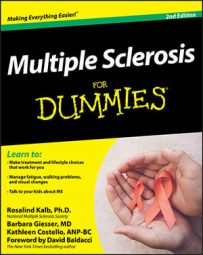The good news is that many first-line treatment options are available to treat multiple sclerosis (MS) — and more are being developed. The challenge is that with more options, you have more considerations when making a choice. Following are some important facts information about each of the injectable medications:
Interferon beta medications
Interferons are naturally occurring proteins that are important to the body’s defense against viral infections. Although no one knows exactly how the interferon beta medications work in MS, they seem to reduce the activation of inflammatory immune system cells and slow the movement of immune cells across the blood-brain barrier into the CNS.
The interferon beta medications have had a very strong safety record since the first one was approved in 1993. However, based on the experiences of thousands of people who have taken these medications since 1993, the FDA has issued some warnings and precautions for each of them.
If you’re depressed or have a history of depression, you should use the interferon products with caution because some evidence indicates that these meds may increase depressive symptoms. So, if you’re feeling depressed or have a history of depression, be sure to let your physician know about it. This conversation can help you and your doctor make the best possible treatment decisions for you while also keeping an eye on your mood.
In addition, baseline testing of your liver functions is recommended prior to starting any of these medications, as well as periodic testing as long as you’re taking the medication. Make sure your doctor knows if you have any history of cardiac disease or seizures.
The interferon beta medications include two different formulations of interferon beta-1a and two identical formulations of interferon beta-1b:
Avonex (interferon beta-1a): Avonex has been shown in clinical trials to reduce the frequency of relapses and the number of new or active lesions on MRI scans, and to slow disease progression. It’s approved to treat relapsing forms of multiple sclerosis (which includes secondary-progressive MS in those people who continue to have relapses).
Avonex has also been shown to delay the onset of MS in people who have experienced one clinical episode of demyelination (damage to the myelin in the CNS) that puts them at risk for developing MS. The FDA has approved Avonex for this purpose. For more information, contact MS Active Source at (800) 456-2255.
Rebif (interferon beta-1a): Rebif has been shown to reduce the frequency of relapses and the number of new or active lesions on MRI scans, and slow the progression of disability. It’s approved in the United States to treat all relapsing forms of MS.
Rebif has also demonstrated its ability to delay the onset of MS in people with CIS, and the company has applied to the FDA for approval of this use of the medication. For more information, contact MSLifeLines at 877-447-3243 or find it online.
Betaseron and Extavia (interferon beta-1b): Betaseron has been shown in clinical trials to reduce the frequency and severity of relapses and reduce the number of new or active lesions on MRI scans. It’s approved in the United States to treat all relapsing forms of MS.
Like Avonex and Rebif, Betaseron has been shown to delay the onset of MS in people with CIS, and the FDA has approved it for this use. For more information about Betaseron, contact BETAPLUS at 800-788-1467 or visit them online.
Because Extavia is the identical formulation of interferon beta-1b under a different brand name, the FDA didn’t require additional clinical trials before approving its use. Extavia is also approved to treat all relapsing forms of MS and to treat CIS. For more information about Extavia, contact the Extavia Patient Support Program at 866-925-2333.
Copaxone (glatiramer acetate)
Copaxone comprises small protein building blocks called amino acids. It has been shown to reduce the frequency of relapses and the number of new or active lesions on MRI scans. It has also been shown to delay the onset of MS in people with CIS. Copaxone is approved in the United States to treat relapsing-remitting MS and to treat CIS.
As with the interferons, no one is sure exactly how Copaxone works, but it’s believed to work by changing “bad guy” lymphocytes into “good guy” lymphocytes. These good guys cross the blood-brain barrier into the CNS to suppress inflammatory activity. For more information, contact Shared Solutions at 800-887-8100 or online.

